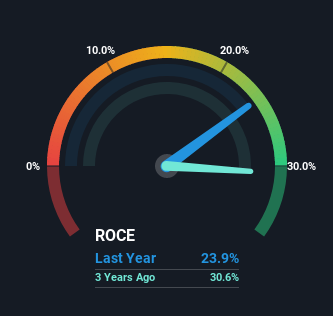If you're not sure where to start when looking for the next multi-bagger, there are a few key trends you should keep an eye out for. In a perfect world, we'd like to see a company investing more capital into its business and ideally the returns earned from that capital are also increasing. Basically this means that a company has profitable initiatives that it can continue to reinvest in, which is a trait of a compounding machine. Having said that, while the ROCE is currently high for ITV (LON:ITV), we aren't jumping out of our chairs because returns are decreasing.
What Is Return On Capital Employed (ROCE)?
For those that aren't sure what ROCE is, it measures the amount of pre-tax profits a company can generate from the capital employed in its business. The formula for this calculation on ITV is:
Return on Capital Employed = Earnings Before Interest and Tax (EBIT) ÷ (Total Assets - Current Liabilities)
0.24 = UK£688m ÷ (UK£4.6b - UK£1.7b) (Based on the trailing twelve months to June 2022).
Thus, ITV has an ROCE of 24%. In absolute terms that's a great return and it's even better than the Media industry average of 12%.
Check out our latest analysis for ITV

Above you can see how the current ROCE for ITV compares to its prior returns on capital, but there's only so much you can tell from the past. If you'd like to see what analysts are forecasting going forward, you should check out our free report for ITV.
What The Trend Of ROCE Can Tell Us
When we looked at the ROCE trend at ITV, we didn't gain much confidence. Historically returns on capital were even higher at 36%, but they have dropped over the last five years. However, given capital employed and revenue have both increased it appears that the business is currently pursuing growth, at the consequence of short term returns. If these investments prove successful, this can bode very well for long term stock performance.
The Bottom Line
While returns have fallen for ITV in recent times, we're encouraged to see that sales are growing and that the business is reinvesting in its operations. And there could be an opportunity here if other metrics look good too, because the stock has declined 45% in the last five years. So we think it'd be worthwhile to look further into this stock given the trends look encouraging.
Since virtually every company faces some risks, it's worth knowing what they are, and we've spotted 3 warning signs for ITV (of which 2 make us uncomfortable!) that you should know about.
High returns are a key ingredient to strong performance, so check out our free list ofstocks earning high returns on equity with solid balance sheets.
New: AI Stock Screener & Alerts
Our new AI Stock Screener scans the market every day to uncover opportunities.
• Dividend Powerhouses (3%+ Yield)
• Undervalued Small Caps with Insider Buying
• High growth Tech and AI Companies
Or build your own from over 50 metrics.
Have feedback on this article? Concerned about the content? Get in touch with us directly. Alternatively, email editorial-team (at) simplywallst.com.
This article by Simply Wall St is general in nature. We provide commentary based on historical data and analyst forecasts only using an unbiased methodology and our articles are not intended to be financial advice. It does not constitute a recommendation to buy or sell any stock, and does not take account of your objectives, or your financial situation. We aim to bring you long-term focused analysis driven by fundamental data. Note that our analysis may not factor in the latest price-sensitive company announcements or qualitative material. Simply Wall St has no position in any stocks mentioned.
About LSE:ITV
ITV
A vertically integrated production, broadcasting, and streaming company, which creates, owns, and distributes content on various platforms worldwide.
Flawless balance sheet and good value.
Similar Companies
Market Insights
Community Narratives





